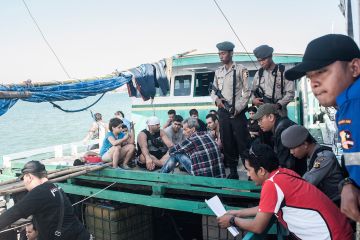JAKARTA — Senior Indonesian officials say they are looking for an island to accommodate some 10,000 asylum seekers and refugees waiting for resettlement in the country, as they have become a “burden.”
Asylum seekers flock to Indonesia from the Middle East, Asia and Africa, hoping to reach Australia. But Indonesia’s southern neighbor has recently announced that all refugees registered at the Jakarta office of the UNHCR refugee agency from July 2014 will now automatically be banned from resettlement in Australia.
Australia’s immigration minister Scott Morrison compares the ban to “taking the sugar off the table,” and says it’s in Indonesia’s interest. “We’re trying to stop people thinking they can go to Indonesia and wait around till they get to Australia,” he told Australia’s ABC Radio late November. “This is designed to stop people flowing into Indonesia. It will help Indonesia.”
But Indonesian authorities don’t see it that way. “It’s Australia’s right, but it’s creating a burden for us,” said Indonesia’s Justice and Human Rights minister Yasonna Laoly on Australia’s ABC News. “There are 10,000 foreign citizens, which becomes a burden for us.”
As a signatory to the United Nations’ Refugee Convention, Australia is bound by international law to protect refugees. Indonesia has not signed the treaty.
Several high-ranking Indonesian officials have now reportedly suggested to president Joko Widodo that these refugees should be moved to one of Indonesia’s 17,000 islands.
“If the Australian government cannot handle them, we suggest placing them on an empty island, so they don’t disturb the public,” Coordinating Political, Legal and Security Affairs Minister Tedjo Edhy Purdijatno told local media late November.
It’s not the first time this option has been put on the table.
In the early 1980s, hundreds of thousands of Indochinese refugees were placed on Galang Island, in the northwest of Indonesia. In 2013, a plan to forcibly resettle refugees on the impoverished and isolated Sumba Island, in the eastern part of the archipelago, was finally abandoned.
“Now we have started thinking again about this policy,” Laoly told The Australian. “We only need to find the island.”
While Indonesian officials have suggested UNHCR could be involved in handling the refugees’ cost of living, the agency’s Indonesian representative Thomas Vargas told GlobalPost he hasn’t been contacted on the matter. He did not want to comment on this specific proposal, but said UNHCR would “certainly not encourage” this kind of option. Placing refugees and asylum seekers on an island “is probably the costliest and the most ineffective way” to deal with the situation, he said.
New asylum seekers arrive in Indonesia every week. Many sleep on the pavement, in front of the UNHCR gates in Jakarta. Tolosa, an 18-year-old Ethiopian, says he made it to Indonesia just two months ago, before Australia announced its new policy. But he says he would have come anyway. Like many here, he says he has nowhere else to go. Tolosa was hoping to get to Australia, but he’s happy to be resettled anywhere.
Actually, even the idea of an empty Indonesian island doesn’t seem to bother him much. “If I go back to my country I might die, so I’m OK with staying on an island,” he said. Other asylum seekers agree. Faisal, a 23-year-old Somalian who calls Australia’s policy “inhumane” and “cruel,” says even an empty and isolated island “is better than going back home and dying there.”
Ahmad, 18, is from Pakistan. He has registered in UNHCR’s office in Jakarta more than a year ago, and hopes he will still get to resettle in Australia. He worries though, as Australia has announced it will also reduce the quotas of resettlement for refugees who registered before July 2014. Soon, Ahmad won’t have any money left. He says he might present himself to one of Indonesia’s overcrowded and run-down detention centers. “Many people try to get into detention centers, even if it’s like prison, because they don’t have money,” he says.
Australian Prime Minister Tony Abbott’s anti-immigration “Operation Sovereign Borders” was launched shortly after he took office late 2013, and has created tensions with Jakarta. Indonesian authorities haven’t been happy with Australia towing back boats of migrants en route to Australia towards Indonesian waters.
Thomas Vargas says Australia, one of the only signatories of the Refugee Convention in the region, should set the example. But Australia’s current policies, he says, are “certainly not in the spirit of the Refugee Convention, and not in the spirit of regional cooperation.”
“Unilateral action by states is not going to work,” he says, calling for all affected countries to work together on a solution that meets the protection needs of refugees and asylum seekers.








